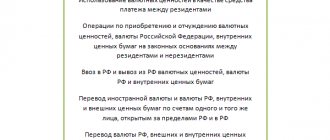The currency and customs legislation of our country is not stable. Even knowing all the nuances and subtleties of foreign economic activity, you may not keep track of the next change or simply make a mistake and face serious fines. Today we will talk about common mistakes of foreign trade participants and their solutions.
Immediately after your business decides to enter foreign markets, it will immediately be faced with a number of issues that need to be studied:
- registration as a foreign trade participant;
- searching for suppliers or buyers;
- solving logistics problems;
- opening foreign currency accounts;
- paperwork;
- currency control;
- and many more questions that require knowledge of legal, customs, accounting principles and nuances.
Alfa-Bank currency control: what is it?
Foreign exchange transactions are inevitable for companies that plan to integrate their business into the global economy and interact with counterparties abroad. According to 173-FZ of December 10, 2003, authorized banks are required to regulate compliance by participants in foreign economic transactions with currency legislation.
For this purpose, banks can request and receive relevant documents from both parties (the list will be presented below). In addition, at the request of the tax authorities, Alfa-Bank is obliged to transfer the copies of the documents listed in Art. 23 173-FZ.
Thus, foreign exchange control is control over the implementation of foreign exchange transactions by residents and non-residents. All companies wishing to confirm that all operations carried out within the framework of foreign economic activity comply with the currency legislation of the Russian Federation undergo this procedure.
Examples of foreign exchange transactions:
- provision of text translation services by a non-resident supplier to a resident buyer for a fee expressed in Russian rubles;
- provision of services for the development of software products by a resident supplier to a non-resident buyer for a fee expressed in US dollars;
- supply of goods to the territory of the Russian Federation by a non-resident supplier to a resident buyer for a fee expressed in euros.
Residents of the Russian Federation are legal entities created in accordance with the legislation of Russia and located on its territory, as well as their branches or branches located outside the Russian Federation.
Non-residents of the Russian Federation are legal entities created in accordance with the legislation of a foreign state and located on its territory, as well as their branches operating on the territory of Russia.
All relations related to the implementation of foreign exchange transactions arise on the basis of a concluded foreign trade contract. All transactions under this contract must be carried out through authorized banks. Their role can be played by credit organizations that have received a license from the Central Bank to conduct banking operations in foreign currency. Alfa-Bank is among the banking institutions that carry out currency control and provide other services that will be useful to companies engaged in foreign trade activities.
How currency control is carried out using an example
Suppose you have agreed with your counterparty that he will supply furniture, and you will make payment for it. Before carrying out transactions, you must open a foreign currency account with Alfa-Bank.
Next, you sign a contract. The conditions and minimum requirements for mandatory details and the form of the contract are established by Letter of the Central Bank No. 300 dated July 15, 1996. From May 14, 2021, new requirements appeared in 173-FZ that relate to the expected deadlines for fulfilling obligations under the contract.
So, the contract has been signed, but before starting payments, it must be submitted to the bank. And in certain cases, register it. Next, calculations are made in strict accordance with the terms of the contract.
What applies to currency transactions
Foreign exchange transactions are regulated by Federal Law No. 173-FZ dated December 10, 2003. According to this law, the following transactions include the following transactions:
Next, we will explain who refers to residents in the context of the law in question, and who refers to non-residents.
Residents can be both individuals and legal entities:
Both legal entities and individuals are also non-residents:
From the above, we can conclude that in 2021, not only organizations, but also ordinary citizens are subject to currency control.
If the parties to a currency transaction are a resident and a non-resident, then it is carried out without restrictions.
In general terms, currency transactions between residents are illegal (Clause 1, Article 9 of Law No. 173-FZ). However, a fairly large number of exceptions are provided, that is, a list of foreign exchange transactions that residents can carry out among themselves. The full list of exceptions is specified in paragraph 1 of Art. 9 of Law 173-FZ. Here are the most common cases of permissible currency transactions:
Details about currency transactions between residents and non-residents are in the article .
Features of service at Alfa-Bank
When you open a foreign exchange account with Alfa-Bank and submit an application for a foreign exchange transaction, you will receive a personal currency controller who will help at all stages of foreign trade transactions and advise on issues of legislation, fines, the correct execution of contracts (agreements) and other things. The employee’s name and contacts will always be at hand in their personal account in the Internet banking system.
In addition, in the Alfa Business Online LC you will be able to receive notifications about possible violations of the law, which will help you avoid fines and blocking of accounts.
As an Alfa-Bank client engaged in foreign economic activity, you will be able to attend closed events dedicated to currency examination, which are held every month. There you will learn about changes in currency legislation, meet experts in the field of currency control, and receive professional advice on all issues.
Advantages of servicing at Alfa-Bank:
- all operations within the VC are carried out online - only in rare cases is a visit to the territorial office required;
- high-quality customer support - a specialist will answer all questions, warn you about deadlines and, if necessary, fill out a confirmation certificate for you;
- a separate tariff “Alfa-Business Foreign Economic Activity” for legal entities and individual entrepreneurs engaged in foreign economic activity, with reduced commissions for transactions;
- To pass currency control, you need a small package of documents - a contract, an agreement, a customs declaration, a consignment note, and all other documentation - a transaction passport, a certificate of supporting documents, a certificate of foreign exchange transactions (CVO) - Alfa-Bank, at the client’s request, will prepare it itself.
Disadvantages (according to reviews from entrepreneurs):
- high cost of bank services within the framework of currency control;
- inconvenient functionality of the personal account in the Internet banking system, which makes it difficult to conduct currency transactions.
Services in addition to currency control
In addition to currency control, Alfa-Bank provides other services that will help entrepreneurs conduct foreign economic activity comfortably and safely.
These services include:
- full-fledged consulting support, free consultations (how to start foreign economic activity, how to conduct operations, draw up contracts), assistance in selecting banking products for legal entities engaged in foreign economic activity, and assistance in structuring the transaction;
- buying and selling currencies at the best rate online - you can convert up to 60 currency pairs; ruble transfers and extended operating hours;
- transfers in foreign currency (23 currencies) - regular and urgent;
- international letters of credit - a guarantee that the counterparty will fulfill its obligations under the contract;
- protection against unpredictable currency fluctuations - reducing risks during conversion;
- dual-currency deposits (increased profitability, free conversion);
- trade financing within the framework of foreign economic activity (cheaper than conventional lending) - optimization of financial flows and protection of the interests of the resident client.
Offers from bank partners:
- access to the international B2B platform Opportunity Network, where you can find business partners around the world among clients of leading international banks;
- interaction with the Federal Customs Service (FCS) - a customs representative and an authorized economic operator will organize cargo clearance and provide legal support;
- transport services (logistics) - delivery of goods to any point in the Russian Federation, as well as export of cargo abroad;
- tax consulting and audit for participants in foreign economic activity.
In addition, the task of the currency controller includes comprehensive client care. That is, you will receive timely information about changes in currency legislation, restrictions for LLCs and individual entrepreneurs, the procedure for conducting transactions and their reflection in the documentation. The employee will also familiarize you with the list of documents. which will help avoid penalties from supervisory authorities.
Organization of control over foreign exchange agreements
The main bodies in the Russian Federation responsible for the implementation of legislative norms include the Government, the Central Bank, and federal authorities.
Structures involved in securities activities, register registrars, and authorized banks are classified as control agents. In their activities, agents are accountable to the Central Bank and federal authorities.
The government ensures coordination of the work and interaction of agents and control bodies during the execution of powers, and their accountability to the Central Bank of the Russian Federation.
Within the framework of the received powers, controlling structures (agents, authorities) study agreements, compliance by companies and citizens with a legally defined procedure for moving currency through the customs borders of the country.
Important! Starting from 2021, the tax service and customs structure are exempt from agency activities, since now, by decision of the Government of the Russian Federation, they are classified as control bodies. The Central Bank extended its supervisory powers over the conduct of transactions with currency to non-credit organizations, including them in accountable structures and thereby expanding the sphere of its influence.
Cost of services within the “Alfa-Business Foreign Economic Activity” tariff
Opening ruble and foreign currency accounts is free of charge. There is no subscription fee for working in your Alfa-Business Online personal account. The cost of an electronic signature for transactions through the Internet banking system is 1,800 rubles.
Cash management services - 3,690 rubles per month, per year, taking into account a 17% discount, you will pay 36,900 rubles.
Fees for ruble transfers:
- external payments in rubles in the Internet banking system to the accounts of LLCs and individual entrepreneurs: 15 instructions - free, over - 25 rubles - per instruction;
- tax and budget payments - no commission;
- transfers to individual accounts: up to 300 thousand rubles per month - 0.5%; up to 800 thousand rubles - 1%; up to 2 million rubles - 1.5%; from 4 million rubles - 3%, over - 10% (in all cases not less than 100 rubles);
- IP payments to your own account as an individual: up to 300 thousand rubles per month - free; up to 800 thousand rubles - 1%, up to 2 million rubles - 1.5%; up to 4 million rubles - 3%, over - 10%. External ruble transfers for orders received on paper - 0.10%, no less than 400 rubles.
The first foreign currency account is serviced free of charge. Servicing the second and subsequent foreign currency accounts will cost you 990 rubles monthly. Intra-bank transfers in foreign currency to the accounts of legal entities, individuals, and individual entrepreneurs are free.
Commission for other currency transactions:
- external payments in US dollars and euros - 0.12% (not less than 25 euros / 25 dollars, but not more than max 200 euros / 200 US dollars);
- cash withdrawal: up to 30,000 currency units - 3.30%, over - 4.40%;
- cash deposit - 0.55%;
- purchase or sale of euros or US dollars for rubles at the current Alfa-Forex rate: up to 100,000 currency units - 0.35%; up to 250,000 - 0.25%; up to 500,000 - 0.20%; up to 1,000,000 - 0.15%; up to 3,000,000 - 0.10%; over - 0.05%.
Responsibilities and rights of participants during operations
Residents and non-residents working in the Russian Federation under currency agreements are required to transfer relevant information about transactions to authorized structures.
Participants in agreements must comply with established rules for accounting and reporting on transactions, and also ensure their preservation for a period of at least 36 months from the date of execution. When violations of the law are detected among organizations and individuals, the latter are obliged to fully comply with the received order of the control authorities regarding the violation.
Persons carrying out transactions with currency in the Russian Federation can receive reports based on the results of inspections (for review), as well as appeal decisions or actions of inspection structures in the manner prescribed by the legislation of the Russian Federation.
Important! In case of unlawful actions of representatives of regulatory authorities, the persons being inspected have the right, in accordance with the Federal Law, to apply for compensation for damage caused by these actions.
Tariffs for currency control at Alfa-Bank
For performing the functions of a currency control agent, Alfa Bank charges a commission from the client (the amount of the commission is indicated excluding VAT):
- currency control when carrying out transactions in foreign currency and Russian rubles under a contract accepted for registration - 0.14% of the contract amount (but not less than 600 rubles);
- deregistration of a contract in the absence of settlements on it - 0.17% (but not more than 1817 rubles);
- currency control when carrying out transactions in foreign currency or Russian rubles under a contract that does not require registration - 0.14% (not less than 600 rubles, but not more than 60,000 rubles);
- filling out a certificate of supporting documents by a bank employee based on documents submitted by the entrepreneur - 770 rubles;
- registration of a contract or making changes to it, if the contract was received through the Alfa-Business Online or Alfa-Client On-line system: during the working day (urgent) - 2,750 rubles, within the period established by the standards (not urgent) — 1000 rubles;
- registration of a contract if it was received remotely in electronic form (for example, by e-mail) or on paper: urgent - 5,000 rubles, non-urgent - 2,000 rubles;
- provision of a bank control statement - 165 rubles per statement;
- provision of copies of documents from the currency control dossier - 100 rubles per copy;
- transfer of a contract to another financial institution - 10,000 rubles;
- acceptance of a service contract from another bank (for example, due to the revocation of a license by the Central Bank): upon receipt of an application through the Internet banking system - 1000 rubles, by e-mail in the form of an electronic document or on paper - 2000 rubles;
- ruble transfers by non-resident clients - 0.05% of the transfer amount (not less than 150, but not more than 3,000 rubles);
- processing certificates of supporting documents received from resident clients via the Alfa-Business Online or Alfa-Client On-line system in electronic form or on paper - 700 rubles per certificate;
- transfers of funds in any currency related to the export of capital abroad - 25% of the transfer.
Results
When carrying out foreign exchange transactions, residents can only use authorized banks. They are also required to report on their currency transactions by submitting supporting documents. The list of documents and the procedure for currency control depend on the amount of the contract and its content.
Sources: Federal Law of December 10, 2003 No. 173-FZ
You can find more complete information on the topic in ConsultantPlus. Free trial access to the system for 2 days.
Opening a foreign currency account at Alfa-Bank
You can open a foreign currency account and subsequently make foreign currency transactions remotely. All you need to do is go to the official website, select the “Alfa-Business Foreign Economic Activity” tariff and submit an application for settlement and cash services.
Next, you need to download an application for service, fill it out and send it along with scans of documents, the list of which can be checked with a specialist at Alfa-Bank. You can submit an application and documents both electronically by e-mail of the bank, and on paper when visiting a territorial branch in person.
You can also download the agreement, sign it with digital signature and send it to the bank by email. After processing the documents, you will receive a notification that you can interact with foreign counterparties and undergo currency examination procedures.
What documents will the bank prepare?
When making payments under a foreign trade contract, an entrepreneur (resident) must provide the bank with a package of documents related to currency transactions. But if you have any difficulties, Alfa-Bank employees will prepare them for you.
The following documents will be required:
- certificate of currency transactions (CVO) - without it, funds will not be credited or debited to a foreign currency account, this certificate is issued in all cases, except for settlements in Russian rubles, the deadline for submission is no later than 15 days from the date the currency is credited to the account;
- documents that serve as the basis for issuing an SVO;
- transaction passport - in accordance with Instruction No. 138-I, the requirements for the procedure for issuing a transaction passport do not apply to contracts if the amount of obligations under it does not exceed the equivalent of $50,000 at the Central Bank exchange rate on the date of conclusion of the contract, or in the event of a change in the amount of obligations under the contract on the date of conclusion of the last amendments to the contract. For each contract, 1 transaction passport is provided. Submission deadlines: no later than the date of registration of the SVO or SPD, no later than the date of submission of the customs declaration to the customs authority. The reasons why a bank may refuse to issue a transaction passport are specified in clause 6.9 of Instruction No. 138-I;
- documents that are the basis for issuing a transaction passport (the bank does this within 3 days from the date the resident submits the documents);
- certificate of supporting documents - deadlines for issuing a certificate: for customs clearance of goods - no later than 15 working days after the month in which the release mark is affixed to the declaration, when registering goods without a declaration and in the case of provision of services - no later than 15 working days after the end of the month, in which supporting documents are drawn up;
- documents confirming the fact of the transaction.
Contacts of the currency control department
If you have any questions or problems during the process of currency examination or conducting transactions in foreign currency, contact the specialist who is your personal currency controller by calling 8 . Currency control department in Moscow - 8 (495) 755-58-58 .
You can also send a letter of appeal by email [email protected] - for clients from Moscow, or [email protected] - for legal entities from the regions. Don’t forget to indicate the name of the individual entrepreneur or LLC, contact person, the branch where you are served, and the full name of your controller.
5 / 5 ( 3 voices)
about the author
Tatyana Nikolaeva Diploma from the Shakhunsky Agro-Industrial College with a degree in Economics and Accounting. She also received her education at the Faculty of Economics of the Moscow Humanitarian and Economic University (MGEI). Tatyana worked at Rosselkhozbank for more than 4 years in the position of “Customer Relations Manager”. [email protected]
Is this article useful? Not really
Help us find out how much this article helped you. If something is missing or the information is not accurate, please report it below in the comments or write to us by email
What mistakes do foreign trade participants make?
A resident who has entered into a contract with a non-resident must draw up and submit a number of documents to various authorities . Moreover, submit it on time, correctly filled out and compiled.
For example, if you submit incorrectly and not on time, or do not submit documents to the bank at all, then the resident faces fines that Rosfinnadzor will collect from him. Rosfinnadzor receives information about violations from the Central Bank, which is obliged to inform authorized banks.
Any transaction begins with an agreement. If the contract is not drawn up correctly, then problems may arise:
- with the bank (the bank is a currency control agent and must check all transactions with non-residents);
- with customs (when drawing up a customs declaration and transporting products across the border of the Russian Federation);
- with tax (for export the rate is 0%, but to confirm it you need to provide a package of documents including an agreement);
- with the foreign counterparty itself.
Improperly drafted contracts can lead to serious violations and large fines. When drawing up a contract, special attention should be paid to the terms of the transaction , indicating all the important details of the agreement, providing for the maximum number of unforeseen circumstances and consequences. If this is not done, then during tax control there may be a refusal to recognize the expenses of a company engaged in foreign economic activity, additional taxes, as well as penalties and fines on them.
To avoid mistakes when drawing up a contract, you need to be constantly in touch with the bank’s currency control department. Specialists of Development-Capital Bank support their clients at any stage of negotiations with counterparties - attentive and competent specialists, ready to help in any non-standard situations
Quite often, mistakes are made when concluding a contract. The result may be problems with customs and currency control. Participants in foreign trade activities check the amount and subject of the contract, but do not pay due attention to such points as advance payment return, delivery time, contract extension, etc.
Comments: 4
Your comment (question) If you have questions about this article, you can tell us. Our team consists of only experienced experts and specialists with specialized education. We will try to help you in this topic:
Author of the article Tatyana Nikolaeva
Consultant, author Popovich Anna
Financial author Olga Pikhotskaya
- Lyudmila
05.26.2021 at 13:00 Good afternoon, A friend wrote a check from abroad in my name, sent a copy of the check, asks that I send by email the data supposedly for opening an account in order to transfer money to my account. I would like to know what I should do in In this situation, what should I do? Can I do this in Russia by visiting a bank? And where can I go in this case?
Reply ↓ Anna Popovich
05/26/2021 at 14:31Dear Lyudmila, in order for the money to be transferred to the account, open it yourself and send its details, this will be enough. All other actions look ambiguous.
Reply ↓
05/13/2021 at 19:35
A resident buys a share in his apartment from a non-resident (Ukraine), received by inheritance. A resident has a foreign currency account, a non-resident wants to receive it in the same currency. What is the procedure for making calculations? In Russia, a proxy acts under a power of attorney (issued in Ukraine). Are payments through a letter of credit with the right of a trustee to receive money legal?
Reply ↓
- Anna Popovich
05/14/2021 at 00:56
Dear Valentina, since we are talking about non-cash payments, payment will be in rubles at the rate of the Central Bank of the Russian Federation on the date of debit from the correspondent account of the executing bank, but with the possibility of subsequent conversion into the desired currency. More precisely, a bank specialist can answer this question for you - +7 495 78-888-78. As for the trustee, such transactions are possible if you have the appropriate rights specified in the power of attorney.
Reply ↓









